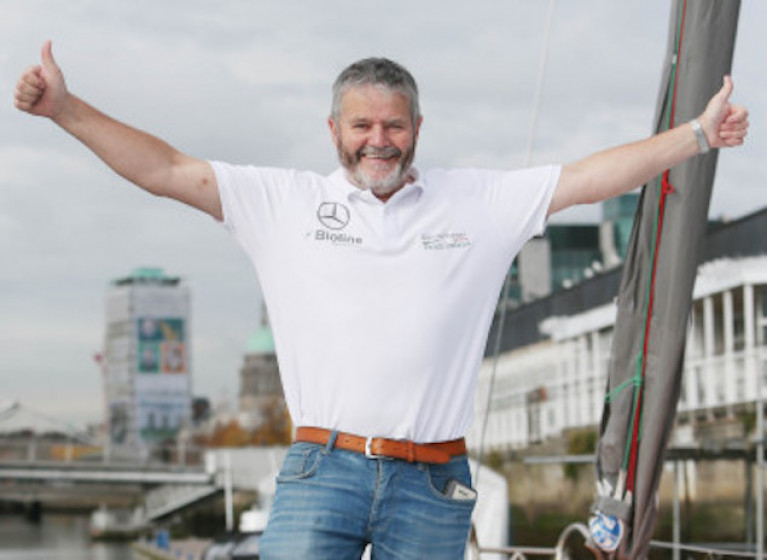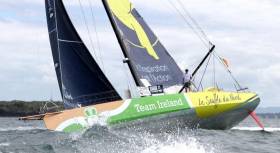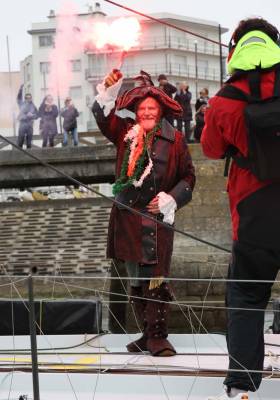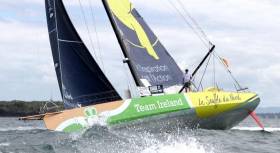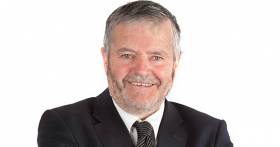Displaying items by tag: Enda O’Coineen
14 million Euro Endurance II Project Spearheaded by Enda O'Coineen
Businessman and sailor Enda O’Coineen is spearheading a 14 million euro project to build a replica of adventurer Ernest Shackleton’s most famous ship, Endurance.
As The Sunday Independent reports, details of an “Endurance II” construction will be outlined at events planned in London and Dublin this week to mark the 150th anniversary of the Kildare man’s birth.
The newspaper says that one of the early backers had been British tycoon and adventurer Hamish Harding, who died last June in the Titan submersible implosion off the Newfoundland coast.
 Endurance crushed by the ice pack in 1915
Endurance crushed by the ice pack in 1915
Mensun Bound, the British marine archaeologist who was director of exploration on the Discovery team that located the wreck of Shackleton’s Endurance off Antarctica in March 2022, is supporting O’Coineen’s plan.
Patrons of the Endurance II project include the Prince of Monaco, Albert II, Alexandra Shackleton, and Richard Garriott, president of the Explorer’s Club.
The newspaper says that an initial 600,000 US dollars, representing five per cent of the capital cost, is currently being sought from 12 “founders”.
It is estimated that construction would require 14 million euros, with a 1.5 million euro annual operational budget.
The original Endurance sank after being crushed in pack ice in 1915 in what Shackleton had described as "the worst portion of the worst sea in the world".
However, images taken by the Discovery expedition show it to be upright and in remarkably good condition in over 3,000 metres of water.
 The stern of Endurance in an image taken by the Discovery expedition in 2022 show it to be upright and in remarkably good condition in over 3,000 metres of water
The stern of Endurance in an image taken by the Discovery expedition in 2022 show it to be upright and in remarkably good condition in over 3,000 metres of water
An assessment published last year by the UK Antarctic Heritage Trust recommended it be left where it is, and said the risk of people travelling to the site to steal from it is “relatively minor”.
Read The Sunday Independent here
Tickets on Sale for Howth K25s’ Kilcullen Fundraising Dinner With Special Guest Enda O’Coineen
Howth Yacht Club’s K25 Keelboat Squad have announced an upcoming fundraising dinner at the club on Friday 3 March to support their 2023 racing campaign in their beloved Kilcullen.
Guests will be treated to a star-studded evening, filled with delicious food, great company and a prize raffle, not to mention special guest speaker Enda O'Coineen — a long-time supporter of the squad, accomplished racing sailor and founder of the Atlantic Youth Trust.
Enda will share his experiences and insights on the sport of sailing, as well as his thoughts on the importance of supporting young sailors.
Tickets for the event at 7.30pm next Friday 3 March are €60 each and are available HERE.
Enda O’Coineen's RIYC Talk on 'Across the Atlantic by Inflatable & Other Ways to Get Wet'
The Royal Irish Yacht Club's 'Home Together' virtual talk this Thursday 4th February will feature RIYC member Enda O’Coineen.
Enda will recount the extraordinary story of his epic transatlantic solo voyage onboard his 16-foot inflatable, the Kilcullen just over 35 years ago.
Having first made landfall in Dunmore East, upon arriving finally in Dun Laoghaire, Enda promptly sold the Kilcullen. It subsequently changed hands several times before Enda finally bought her back and restored her, reviving memories of some extraordinary adventures, long submerged and almost deliberately forgotten.
 The refurbished 5m Humber RIB in which Enda ‘OCoineen crossed the Atlantic in 1985
The refurbished 5m Humber RIB in which Enda ‘OCoineen crossed the Atlantic in 1985
Enda first attempted to cross the Atlantic by inflatable at the age of 22 and almost making it before capsizing off the west coast of Ireland – and being rescued by the NATO war fleet.
Seven years later Enda attempted the voyage for a second time and this time made-it into the record books.
Commences 19:30hrs contact [email protected] to register.
From Enda O’Coineen, in business and adventure, we can learn much. The man sails on a sea of obsession in life — guided only by the goals he sets himself.
He became the first ever Irish entry to qualify for the Vendée Globe. When he didn’t succeed in the solo circumnavigation at his first attempt, due to a broken mast, his default mode was to try again — and he sailed into the history books.
In his daily jousts with the elements at sea, the entrepreneur concludes that for every risk, there is a massive potential for reward and giving back.
But he is alarmed by rules, regulations and controls, hidden in the name of safety and security. Fundamental freedoms are being lost, he says.
The genius is in understanding the balance.
Every four years, an elite group of sailors endeavours to sail single-handed, non-stop in a circumnavigation of the planet, through the most unpredictable and perilous conditions imaginable.
They are the competitors in the Vendée Globe — one of the most arduous, challenging and dangerous events in sport. These sailors know the real adversaries are the waves and the weather, the ice and isolation.
The 2016 race had an Irish skipper competing for the first time, as Irish businessman Enda O’Coineen sailed the Kilcullen Voyager into the annals of sailing history.
But this grand solo voyage did not go to plan.
Also the subject of a documentary that screened as part of the IFI Documentary Festival last month, Enda O’Coineen’s bid to complete the Vendée Globe has been recounted in his own words in a new book.
Journey to the Edge: An Amazing Story of Risk-Taking in Business and Adventure, by Enda O’Coineen, is available from the Afloat shop at €14.99.
“Inspirational” is the word that has leapt out of every set of reports and comments about Enda O’Coineen’s achievement in getting the IMOCA 60 Souffle du Nord/Team Ireland to Les Sables-d’Olonne on Sunday.
Although his lone voyage from New Zealand to France may have started on January 27th and finished on April 1st, it was during the final stages in March that he overcame the Atlantic at its most challenging to bring his ship home to a port which truly appreciates his courage and tenacity, making him a very worthy “Sailor of the Month”.
Irish Solo Sailor Enda O’Coineen Eyes Equator Crossing
After 50 days alone at sea Enda O’Coineen will cross the equator off the coast of Brazil on Friday morning. Crossing the equator is a hugely symbolic event for any sailor and this particular crossing marks Enda entering the final stage of his epic solo round the world voyage. Seafarers traditionally make an offering to King Neptune, the God of the sea, when crossing the equator.
On 6 November 2016 O’Coineen crossed the starting line of the Vendee Globe, a solo non-stop round the world sailing race from France to France. On New Years Day 2017 O’Coineen’s world came crashing down around him as his mast broke 180 miles south of New Zealand. After a week at sea with a jury rig Enda arrived into Dunedin in New Zealand where he partnered with a French competitor who was also forced to drop out of the race. The new team, Le Souffle du Nord Kilcullen Team Ireland, repaired a boat and Enda set sail alone from New Zealand in January 2018 to complete the race course.
Speaking ahead of the crossing O’Coineen said:
“I can’t tell you how much I’m looking forward to crossing the Equator. The trip across the Pacific Ocean and around Cape Horn was filled with huge seas, relentless winds and extremely cold temperatures. Since turning the corner at the infamous Cape Horn I have found myself almost becalmed and have been slowly making my way up the coast of South America. Once over the Equator I will mentally be on the final stretch, still with a transatlantic to do but in the grand scheme that is a short hop.”
50 years since Sir Robin Knox Johnson was the first person to sail alone non-stop around the world. Still no Irish person has completed the ‘Everest of the Seas’. Irishman Gregor McGuckin is taking on this challenge in the Golden Globe Race on 1 July this year using only traditional navigation methods and in a 30+ year old boat.
Enda added:
“For me I’m coming to the end of this adventure but I encourage all to ensure the next generation of Irish maritime adventurers and racers such as Gregor McGuckin, Joan Mulloy and Nin O’Leary are well supported. Living life on the edge in these kind of boats is not for the faint hearted and a few words from well-wishers means a lot. For now, wish me well for my imminent appointment with King Neptune!”
To view the live tracker click here
Enda O’Coineen Sets Course for the Seanad
Sailor Enda O’Coineen has announced his nomination to run as an Independent Candidate in the forthcoming election to Seanad Éireann in the National University of Ireland Constituency. Enda says there are issues he feels strongly about and wishes to make a contribution rather than ' Sit on the Quayside'. In particular, Enda wishes to champion the maritime, the Atlantic Youth Trust's North South youth development Tallship project, the commercial maritime sector, fishing, maritime tourism and business.
Senator Feargal Quinn, who is retiring from the Seanad this year, has endorsed Enda’s bid for the Senate. Other strong endorsements have come from the Author Tim Pat Coogan, Anne Heraty, John Killeen and Feargal O'Rourke.
A graduate of the National University of Ireland Galway, in management and finance, Enda has worked extensively in the US and in Central and Eastern Europe. He has played key roles in several highly successful turnarounds and start-ups and he has made significant contribution to the non-profit and charitable sector.
An overriding philosophy of Enda’s, is a belief in the individual. He believes in personal freedom, personal choice, respect, security and independence - as fundamentals of humanity and a fair, equitable and civil society.
Enda has a passionate belief in, and commitment to, education and will advocate for measures required to allow people access to education and opportunities to learn and develop new skills. He is also an advocate of Seanad reform to include building strong links with the Diaspora who should be represented.
As a successful entrepreneur himself, Enda recognises that we need to create an entrepreneurial culture in Ireland, one where people are encouraged to explore opportunities to pursue business ideas and where the State nurtures and supports them in doing so. He is also a strong supporter of instilling the entrepreneurial spirit - way beyond business into everyday life - as part of our ‘DNA’. He believes that a dynamic entrepreneurial culture needs to be nurtured early and often, starting at primary school level through to secondary and third level institutions and state organisations.
Enda believes that our Maritime and Ocean Resources provide huge underutilised potential from a tourism, cultural, sporting and enterprise perspective. Enda has been actively involved all his life in promoting and developing the marine sector. He has seen the value that marine industries can deliver to companies and indeed countries around the world.
In addition to success in management, finance and leadership, O’Coineen believes strongly in ‘putting something back’ and in particular has contributed significant time and personal resource into youth development and community. This includes being a founding Chairman, on a totally voluntary basis of the Volvo Ocean Race project in Ireland and his involvement in the Green Dragon Volvo Team, which generated over €100m directly to the Irish economy.
He is the Founding President of the Atlantic Youth Trust under the Chairmanship of Lord Glentoran in Northern Ireland. Through his work with youth charity, he has helped to introduce thousands of young people to ocean adventure, challenge and personal development.
Enda O’Coineen is a published author with four books to date, including The Unsinkable Entrepreneur. He is a family man with three daughters and a son.


























